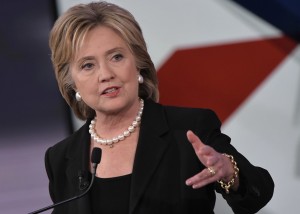
Des Moines, Nov. 17 – Presidential hopeful Hillary Clinton pledged to be a strong voice for people with disabilities.
“This has been a strong concern and priority of mine,” Clinton said in an exclusive interview with The RespectAbility Report immediately following the Democratic presidential debate in Iowa Saturday night.
The former Secretary of State’s first job out of law school was with the Children’s Defense Fund, where she worked to pass the Individuals With Disabilities Education Act (IDEA) after discovering parents were not sending their children to school because schools did not accommodate children with disabilities. She often references this work on the campaign trail when asked about people with disabilities.
However, for the first time since celebrating the 25th anniversary of the Americans with Disabilities Act in July, Clinton delved a little deeper, providing a bit more background on her work in this area. She promised continued support for ratifying the U.N. Convention on the Rights of People with Disabilities.
“You can count on me. I will fight for people with disabilities to provide more opportunity, and to make sure we keep fighting against discrimination.”
Clinton’s statement of commitment follows her recent comments on mental illness and autism. In addition, her campaign website has a page dedicated to disability issues and campaign staffers are beginning to pay attention to accessibility needs at events.
Former U.S. Sen. Tom Harkin (D-IA,) one of the lead Americans with Disabilities Act authors, recently endorsed Clinton, who praised him for his work on the ADA.
“I am proud to have been endorsed by Tom Harkin, because I admire everything about him, but, in particular, his extraordinary leadership on disabilities.”
That being said, Clinton has not yet provided any specifics for how she would actually provide more opportunities for the 56 million Americans with disabilities, particularly for the 20 million who are working age, the majority of whom who are looking for employment.
Fully one-in-five Americans have a disability and polls show that most of them want to work. Yet 70 percent of working-age Americans with disabilities are outside of the workforce. This leads to poverty and costs taxpayers billions of dollars in disability benefits.
More than 50 percent of Americans report having a family member or close friend with a disability. Fifty-two percent of Democrats report that they or a loved one have a disability, and for Republicans, a smaller number of 44 percent report they have a disability. Surprisingly, Independents have the largest number of voters who say they have a disability, with 58 percent saying yes. This shows that swing voters with disabilities and their families are up for grabs.
Read the Full Transcript of the Video:
You know the first job I had out of law school was working for the Children’s Defense Fund. And the first project that I did was going door to door to collect information about children with disabilities who were not in school. And then I was part of submitting that to the Congress, so we could get the Individuals with Disabilities Education Act. This has been a strong concern and priority of mine ever since.
I am proud to have been endorsed by Tom Harkin, because I admire everything about him but in particularly his extraordinary leadership on disabilities. I pushed to get the Disability Convention, that the U.N. had put together, passed through the Senate and was heartbroken the Republicans blocked it.
So you can count on me, I will fight for people with disabilities, to provide more opportunity and to make sure that we keep fighting against discrimination. And there is a lot of work still to be done.
The RespectAbility Report is a nonpartisan political commentary on the 2016 U.S. elections with a focus on disability issues. The RespectAbility Report is nonpartisan and neither rates nor endorses candidates. For information about all of the candidates, please visit The RespectAbility Report.
[…] first interview with a presidential candidate happened after being seated next to the exit door of Hillary Clinton‘s debate watch party. I positioned myself in front of Clinton’s path and asked to speak […]
[…] disease does. In addition, whenever she would be asked any question relating to disability issues, her go-to answer was to talk about her work with the Children’s Defense Fund in the 1970s, well before the […]